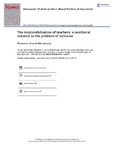The responsibilisation of teachers: a neoliberal solution to the problem of inclusion
| dc.contributor.author | Done, Elizabeth | |
| dc.contributor.author | Murphy, M | |
| dc.date.accessioned | 2018-09-10T07:49:07Z | |
| dc.date.available | 2018-09-10T07:49:07Z | |
| dc.date.issued | 2018-01-02 | |
| dc.identifier.issn | 0159-6306 | |
| dc.identifier.issn | 1469-3739 | |
| dc.identifier.uri | http://hdl.handle.net/10026.1/12257 | |
| dc.description.abstract |
This paper critically examines competing demands placed on teachers, with reference to recent inclusion policy in England and Australia. The authors draw on Michael Foucault’s analysis of power, neoliberalism(s) and biopolitics to explore the ways in which teachers are ‘responsibilised’ into negotiating and fulfilling demands related to both state-imposed accountability practices and social justice agendas. The economic context and associated ‘politics of austerity’ are taken into account in a critical exploration of how the (biopolitical) management of inclusion in the neoliberal present coincides with diminishing funding for social and educational expertise, with ever-increasing responsibilities being placed on teachers to fill this void. The responsibilisation of teachers in recent legislation and statutory guidance discursively constructs the teacher as a professional who takes responsibility for student and school performance, pastoral care, inclusion and social change. Responsibilisation relies on ‘dividing practices’, obliging some teachers to assess the conformity of colleagues to inclusion policy. | |
| dc.format.extent | 142-155 | |
| dc.language | en | |
| dc.language.iso | en | |
| dc.publisher | Informa UK Limited | |
| dc.subject | Foucault | |
| dc.subject | educational neoliberalisation | |
| dc.subject | inclusion | |
| dc.subject | responsibilisation | |
| dc.subject | dividing practices | |
| dc.subject | biopolitics | |
| dc.title | The responsibilisation of teachers: a neoliberal solution to the problem of inclusion | |
| dc.type | journal-article | |
| dc.type | Journal Article | |
| plymouth.author-url | https://www.webofscience.com/api/gateway?GWVersion=2&SrcApp=PARTNER_APP&SrcAuth=LinksAMR&KeyUT=WOS:000428752100011&DestLinkType=FullRecord&DestApp=ALL_WOS&UsrCustomerID=11bb513d99f797142bcfeffcc58ea008 | |
| plymouth.issue | 1 | |
| plymouth.volume | 39 | |
| plymouth.publication-status | Published | |
| plymouth.journal | Discourse: Studies in the Cultural Politics of Education | |
| dc.identifier.doi | 10.1080/01596306.2016.1243517 | |
| plymouth.organisational-group | /Plymouth | |
| plymouth.organisational-group | /Plymouth/Faculty of Arts, Humanities and Business | |
| plymouth.organisational-group | /Plymouth/Faculty of Arts, Humanities and Business/Plymouth Institute of Education | |
| plymouth.organisational-group | /Plymouth/REF 2021 Researchers by UoA | |
| plymouth.organisational-group | /Plymouth/REF 2021 Researchers by UoA/UoA23 Education | |
| plymouth.organisational-group | /Plymouth/Research Groups | |
| plymouth.organisational-group | /Plymouth/Research Groups/Institute of Health and Community | |
| plymouth.organisational-group | /Plymouth/Users by role | |
| plymouth.organisational-group | /Plymouth/Users by role/Academics | |
| dc.identifier.eissn | 1469-3739 | |
| dc.rights.embargoperiod | Not known | |
| rioxxterms.versionofrecord | 10.1080/01596306.2016.1243517 | |
| rioxxterms.licenseref.uri | http://www.rioxx.net/licenses/all-rights-reserved | |
| rioxxterms.type | Journal Article/Review |


